

Por tercer año consecutivo, la OIV vuelve a contar con el respaldo del consorcio internacional de empresas formado por Familia Torres (España), Masi Agricola (Italia), Moët & Hennessy (Francia), Sogrape (Portugal), Viña Concha y Toro (Chile) y Yalumba Family Winemakers (Australia) para la concesión de distintos tipos de becas de investigación.
Becas de investigación de corta duración
En el marco de su Plan Estratégico, la OIV ofrece todos los años becas de investigación sobre temas prioritarios. Las becas de corta duración (de 6 a 15 meses) tienen una dotación de hasta 15 000 euros y se conceden en el marco de determinados programas de posgrado. Los candidatos han de tener la preparación necesaria, tener interés en la investigación y conocer las últimas novedades en su ámbito de especialidad.
Becas de investigación de 3 años
¿Tiene usted un proyecto de I+D? ¿Le gustaría profundizar en un ámbito científico relacionado con los temas prioritarios de la OIV? Solicite una beca de investigación de 3 años, dotada con hasta 50 000 euros.
Participan:
-
La OIV, que firma un acuerdo con el becario o la becaria.
-
El becario, que ha de tener una titulación universitaria superior y estar interesado en cursar un doctorado o posdoctorado, o en llevar a cabo una investigación de 3 años. El becario no puede ser empleado de ninguna empresa.
-
El consorcio internacional de empresas.
-
Un laboratorio universitario de investigación vinculado a una facultad con estudios de doctorado, que acogerá al becario y supervisará su trabajo académico mediante la figura del supervisor.
Temas prioritarios para las becas de investigación (2025)
Las becas de investigación versarán sobre alguno de los siguientes temas prioritarios:
A. Abordar los desafíos del cambio climático, la gestión del agua, los suelos y la biodiversidad mediante soluciones para una vitivinicultura sostenible
- Biodiversidad y otros indicadores objetivos para medir los impactos y las dependencias de la vitivinicultura en los ecosistemas, incluidos indicadores cuantitativos claves de sostenibilidad y servicios ecosistémicos de los viñedos.
- Gestión tecnológica en viticultura ante olas de calor y variaciones de temperaturas máximas en primavera y verano.
- Nuevos enfoques para la protección de las plantas y el manejo de enfermedades (tecnología de ARN interferente, alternativas al cobre, gestión de la biodiversidad y biocontrol de plagas de insectos, manejo integrado eficaz de plagas).
B. Despliegue de avances tecnológicos en materiales para la producción, procesamiento y envasado de uva y vino
- “Materiales innovadores” como nuevas soluciones para aplicaciones en vino, incluidos los vinos desalcoholizados.
- Nuevos enfoques, ahorro energético y reducción de la huella de carbono en la producción de vino: nuevos materiales de bajo impacto ambiental para el transporte, envasado y conservación de uvas y vino, desarrollo de innovadoras botellas de vidrio ultraligeras y alternativas al vidrio.
- Reducción del impacto ambiental vinculado al proceso de elaboración del vino y a los métodos de análisis.
C. Gestionar toda la cadena de valor para mejorar la resiliencia sistémica del sector mundial de la uva y el vino
- Percepción del consumidor y disposición a pagar por atributos de sostenibilidad y servicios ecosistémicos relacionados con los viñedos como elemento de valoración del vino: impactos en la respuesta emocional, preferencias y comportamientos de compra de alto nivel. Mejores indicadores de sostenibilidad.
- Sostenibilidad social, económica y medioambiental: valiosa aportación del viñedo a la economía, la cultura y la tradición, incluyendo su papel en el mantenimiento de la población rural y el desarrollo del enoturismo.
- Barreras comerciales: barreras arancelarias y no arancelarias al comercio, incluidas las represalias cruzadas, los requisitos de etiquetado, la información sanitaria y las restricciones de comercialización. Barreras de propiedad intelectual relacionadas con el comercio, incluidas las indicaciones geográficas y las marcas.
D. Consumidor: seguridad, nutrición, salud e información
- Efectos del consumo de vino y productos derivados de la uva sobre las enfermedades y la salud (en particular, mortalidad por todas las causas y consumo de vino, consumo de vino y el sistema inmunológico, incluidas las enfermedades autoinmunes, la longevidad, los polifenoles y las enfermedades gastrointestinales).
- Relaciones entre los aspectos culturales y sociales y el consumo de alcohol: tendencias emergentes en los patrones de consumo e influencias que contribuyen a ellos, beneficios sociales y psicológicos del consumo de productos derivados de la uva y riesgos potenciales relacionados con el mal uso del vino y las bebidas alcohólicas derivadas de la uva (normas sociales, recomendaciones de consumo, etiquetas de advertencia sanitarias).
- Información al consumidor y marketing: información online y offline, normas de comercialización de bebidas alcohólicas y su relación con cuestiones de salud.
- Herramientas y estrategias de comunicación para prácticas sostenibles relevantes para los consumidores.